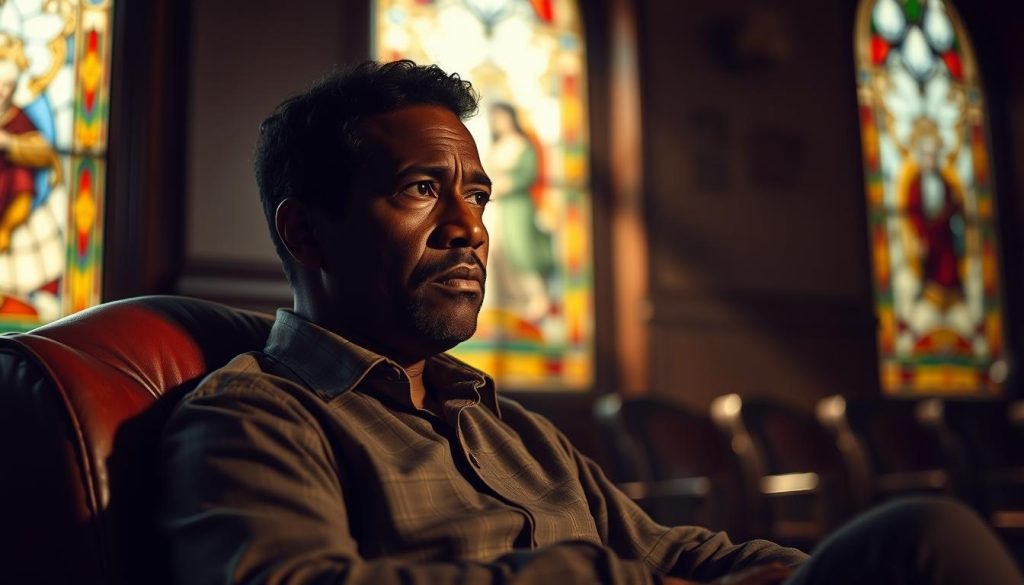Christian business owners often face a tough choice. They have to balance wanting to succeed with staying true to their moral values. Imagine the challenging moments when these owners wrestle with the mix of capitalism and their faith. These aren’t just ideas; they are real situations that touch every part of their lives and choices.
Many struggle with how to be profitable yet keep their Christian ethics in business. Every time they look at their finances or plan their business, they feel a tension. They wonder if it’s possible to follow Christ and still make money. This journey mixes hope, faith, and sometimes sadness as they explore how to run an ethical business in a capitalist world.
Understanding Capitalism from a Christian Perspective
Capitalism and Christian values spark much debate. Viewing economics through Christianity involves biblical rules and ideas about wealth. Augustine and Aquinas, historical theologians, discussed wealth’s morality. They believed earning wealth wasn’t wrong if it followed biblical guidelines.
From a Christian view, being responsible with our resources is key. This idea matches well with the free market’s focus on personal responsibility. Yet, the discussion gets complicated when we think about helping those in need.
Prosperity theology suggests faith could lead to wealth. This idea often aligns with capitalism but faces criticism for overlooking the poor. More traditional Christian thinkers advocate for helping those in need. For deeper insights on capitalism and Christian ethics, the Free Market Forum by Hillsdale College is a great resource.
Looking at capitalism through Christianity demands balance. We must mix free market benefits with the ethical musts of charity and justice. This balance is crucial in blending faith with managing wealth.
Ethical Challenges in Capitalism for Christian Entrepreneurs
In the business world, Christian entrepreneurs deal with business ethics and moral dilemmas in business. Earning money can sometimes go against Christian leadership values like honesty, integrity, and helping others. These issues are not just ideas; they happen in real life every day.
Patagonia is a well-known outdoor clothing brand. It’s led by Yvon Chouinard. The company gives 1% of its profits to help the environment. This shows the hard choice between profit vs. principle. Christian business people face tough decisions about paying their employees. They need to offer good pay but also fair wages. This is hard when trying to make money and support people.
Thinking about where products come from is another issue. Companies like Apple have been criticized for their suppliers’ work environments. For a Christian leader, making sure work conditions are fair can mean spending more money. This shows how following business ethics can cost a lot, but it’s important for staying true to values.
Christian business leaders have to think about their impact on the world. Christian leadership means focusing on helping others, not just making money. This can mean making hard choices and sometimes losing out on profits.
- Patagonia’s choice to help the environment over making more money
- Choosing fair wages over high pay in hiring employees
- Keeping a fair working environment, even if it costs more
Even with these tough choices, many Christian business people feel happy. They can bring together their faith and their work life. They build businesses that do good and are in line with their beliefs. They navigate moral dilemmas in business, making sure their work is both successful and true to their faith.
Is God Against Capitalism?
Has God always been against capitalism? This question has puzzled Christian thinkers for ages. They look into the Bible, trying to find clear answers. But the Bible talks about money, wealth, and how to use them in different ways. This leads to many ideas on the topic among believers.
Some parts of the Bible warn us about the dangers of loving money too much. For example, 1 Timothy 6:10 says, “For the love of money is a root of all kinds of evil.” This warns us about the risks of putting money first in our lives.

But the Bible also shows us times when God blesses people with wealth. Stories about Abraham and Solomon show us that wealth can be a sign of God’s favor. This poses a challenge to the idea that Christianity is always against capitalism.
Today, people talk about how we can combine faith and business in a good way. Some people think capitalism doesn’t fit with Christian values. Yet, others believe it’s possible to be faithful and still succeed in business.
In the end, believers have many different views on this. They range from warnings about greed to seeing wealth as a blessing from God. This debate shows us that faith and capitalism have a complex relationship. It encourages us to keep thinking about how to blend spiritual and economic goals.
Balancing Faith and Profit in a Capitalist Society
For Christian entrepreneurs, balancing faith and profit is tricky. A strong faith-based business strategy goes beyond just making money. It focuses on moral integrity and mixing spiritual principles into business.
Social entrepreneurship is a key way to make ethical profits. It involves starting businesses that help society and make money. This lets entrepreneurs stick to Christian values of helping others. It also means the pursuit of success doesn’t hurt their core spiritual beliefs.
Leaders like Chick-fil-A’s Truett Cathy show how faith and ethics can lead to success. He kept his stores closed on Sundays, showing his commitment to Christian values. His story shows you can succeed in a capitalistic society without compromising your faith.
By using a faith-based business strategy, focusing on social entrepreneurship, and making ethical profits, Christian business owners can align their work with their faith. This approach ensures they stay true to themselves and inspire others in the business world.
Conclusion
As we wrap up, we see that Christianity and capitalism have a complex relationship. Christian entrepreneurs often find themselves at a crossroads. They must balance making money with following their moral values.
This article has shown us how important it is for businesses to be ethical. Christian leaders should run their businesses according to their faith. When they do, they create a workplace where both business and spiritual growth can happen together. It’s clear that making a profit and being ethical can go hand in hand.
Being morally capitalist is possible; it’s a challenge for people of faith in business. They can lead by example. They make ethical choices and build fair workplaces. By doing this, they show it’s possible to honor their faith and achieve economic success. They turn the business world into a place where ethics and earnings grow together.



